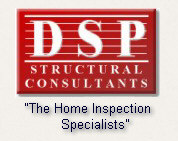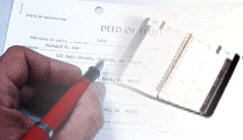|

|
This
site runs best using Microsoft
Internet Explorer |
|

|
|
|
|
Download
The Newest Version of Adobe Acrobat
Reader |
|

|
|
|
|
| |
| A little
time spent in planning and preparation before the Inspection, will help reduce your
chances of uncertainties during and after the Inspection. |
|
| Many buyers arrive at their Home Inspection unprepared. They are
not aware of what all is involved in an Inspection, so they are not able to adequately
prepare for it. Due to this, sometimes a buyer will have questions or concerns
arise about the home. . .often days after the inspection was performed.
Many times these questions could have been answered by the
Inspector, had it been brought to his attention.
The following sections will explain what a
Home Inspection is, and what you as a buyer, can do to better prepare yourself for one. |
| What Is A Home Inspection? |
| A Home Inspection is a visual inspection of a
structure, made by a qualified professional, who is trained and has experience in
evaluating all the component features in a house, and who is able to give a clear and
accurate picture of the condition of these components. It is important to remember that a
Home Inspection is basically visual in nature, with no intrusive drilling or digging
performed. When you and your Home Inspector have completed the Inspection, the house must
be in the same (or better) condition than it was when you first began.
A Home Inspection should have a distinct
two-prong focus. First, the primary goal is to clearly identify any
potential significant defect that will affect your buying decision, and give you a
realistic approximation of repair costs. Second, is to clearly identify
any areas in need of near term repairs, or any components that are reaching the end of
their useful life span. Even though it is secondary, this area provides very useful
information that you will need when setting up your maintenance budget.
A typical Home Inspection can be separated
into three distinct areas:
- The Home Inspection – where you meet
your Home Inspector and the actual evaluation of the property takes place. The
inspection of a typical home usually takes between 1½ to 3 hours, depending upon the size
and condition of the home.
- Resource After The Inspection – an
Inspector should make himself available to you after the Inspection, to clarify or answer
any questions you may have about the Inspection and Report. This is part of the
Inspection, and you should not expect to be charged an extra fee for this. An Inspector
can be an invaluable resource for you, long after you have moved in. He can help provide
you with referrals for contractors, advice and tips on home repairs, etc. Most Inspectors
will not charge you for consultation over the telephone. If you want a home visit however,
expect a fee to be involved.
A quality Home Inspection, performed by a
professional, is designed to provide you with the information you need to make a more
informed decision about your potential purchase. You should be able to walk away from the
Inspection knowing, in a clear way, what your immediate major issues are (if any), and
what items will need repair and/or maintenance in the near term. |
| Gather
Information About The Home |
 |
Gather together pertinent information
about the home that may be useful to the Inspector, when you meet him for the Inspection.
These items could include the MLS (Multiple Listing Service) Data sheet, which gives the
square footage of the house, the year it was built, and other important information; a
copy of the Seller’s Disclosure Statement, which can be helpful when trying to
establish historical continuity; copies of any previous Home Inspections; and any other
useful information you may have. The more information that your Home Inspector has about
the property he is inspecting, the better he is able to do his job. |
| Prepare Questions |
| Make a list of any questions or
concerns you have about the house, based upon your initial visit(s). If you are
not familiar with the workings of a particular type of system or appliance in the house,
note this as well. Are you planning to remodel after you move in? Maybe enlarge a room and
move some walls but are not sure whether or not you can? Make note of this, too. Share
your questions and concerns with your Inspector, when you meet at the property. Remember,
this is your Inspection! The purpose of the Inspection is not only to identify
potential significant defects, but also to answer questions you may have about the
operation and maintenance of the components in the house. |
| Pad And Pencil |
| Be sure to bring something to take notes with. Your
inspector will likely share valuable insights into the workings of your home, that may be
worth noting. You may also wish to record measurement of room sizes, floor layout, lot
layout, etc.
Some Sellers’ will not permit pictures to be taken of
the inside of the home, unless prior permission is granted. If you want to take pictures,
you should have your Realtor contact the Seller for permission, prior to the inspection. |
| Consider Optional Testing |
| In addition to a general Home Inspection, you should be aware that
optional testing in certain specific areas, is often desirable. Radon Testing,
Pest Inspections, Lead Paint Testing, Asbestos Testing, etc.,
are several of the more commonly requested additional tests. Most Home Inspectors
should be able to coordinate any additional |
| testing for you. These optional tests are
rarely included in an Inspectors standard fee, so be sure to ask about the extra costs
involved. Also, be sure that the individual performing the additional testing is qualified
in that particular area. Some testing (such as Radon) should only be performed by an
individual with the necessary credentials. For instance, to be certain of the accuracy of
a radon test result, and if the result is going to be used in a Real Estate transaction,
we strongly recommend that all testing be performed only by individuals that have
completed the training |
 |
prescribed by
the EPA through their Radon Proficiency Program. The in-depth training and certification
process provided, will help to ensure that the individual performing the measurement is
qualified to do so.
Be sure to contact your Home
Inspector in advance, so he can prepare and coordinate the additional tests for
you. If you plan on having any of these tests performed as a part of the general Home
Inspection, often times they must be agreed upon ahead of time, and written into your
Purchase Agreement with the Seller. You should contact your Realtor or your Attorney, to
be sure that the specific additional test(s) you want performed is specified in your
Purchase Agreement. |
| What If You Can’t Be
Present For The Inspection? |
| Obviously, being able to walk through the house and talk face-to-face with the
Inspector is the best option. However, there are many times, due to various circumstances,
where a buyer cannot be physically present for the Home Inspection. This is a frequent
occurrence, and there are several steps you can take to help ensure that the information
you need is conveyed to you in an accurate and timely manner.
If you can’t personally be present at
the Home Inspection then:
- Have a friend or relative join the
Inspector at the home. Convey to them any specific questions or concerns you have, so they
can relay this information to the Inspector. Have them take notes for you. Always try to
talk to your Inspector by telephone after the Home Inspection!
- Talk to your Inspector by telephone after
the Home Inspection. It is important to connect with your Inspector verbally, as soon
after the Inspection as possible. He will be able to review his notes with you, and
summarize what the major issues are (if any), and what areas are in need of near term
maintenance. This first-hand information is invaluable in giving you a clear picture of
the condition of your home. You need to be made aware of any potentially significant
defects, as soon as possible. Most Inspection Companies have toll-free telephone numbers,
and will encourage out-of-state clients to use them.
- Your Realtor can assist by
accompanying the Home Inspector, taking notes for you.
Always try to talk to your Inspector by telephone as soon
as possible, after the Home Inspection! |
| Should The Seller Be Present For
The Inspection? |
| Generally,
no. There are some things that work, and then there
are some things that don’t work. Having the Seller present during an Inspection is
something that often does not work! A professional Home Inspection, by its very design, is
intended to be thorough and complete. Often times a Seller can become defensive because he
feels the privacy of his home is being invaded. Sometimes a Seller can even become angry,
if defects are found, or areas of "do-it-yourself" renovations are noted.
Remember, this is your inspection. This
is the time for you and the Inspector to look at the house, and be able to freely discuss
what you are seeing without fear of hurting someone’s (the Seller’s) feelings.
When a Home Inspection is scheduled, it is important to emphasize this to your Realtor.
If you happen to be purchasing a home
without the services of a Realtor, then the responsibility of interacting directly with
the Seller, will be totally up to you. It can sometimes be difficult asking a Seller not
to be present, during the Inspection. After all, this is still his home. We have found,
however, that if at all possible, it is the best route to take. |
|
